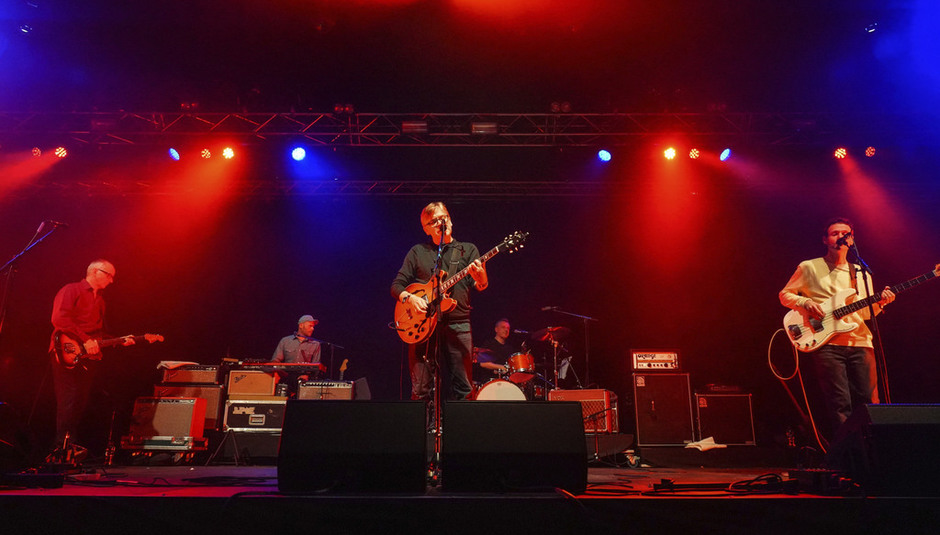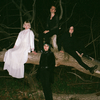Teenage Fanclub are something of an institution in indie rock circles. Formed in the Glasgow suburb of Bellshill some twenty-nine years ago, the core of the band - Norman Blake (vocals, guitar), Raymond McGinley (vocals, guitar), and Gerard Love (vocals,bass) - has remained the same throughout their existence until last month when Love announced he would be leaving the band after their UK tour in November.
Perhaps best known for the four albums (Bandwagonesque, Thirteen, Grand Prix, Songs From Northern Britain) released on legendary imprint Creation during the 1990s, Teenage Fanclub have continued to put out critically acclaimed records culminating in 2016's Here, their eleventh to date.
Last month they reissued five of their most revered albums (the aforementioned four above along with Howdy!, released on Colombia in 2000) on vinyl and in November, embark on a twelve-date tour across four cities that will see them play each one in full across consecutive nights.
We caught up with Norman Blake to talk about the past, present and future of Teenage Fanclub.
DiS: Teenage Fanclub are regarded as one of the most influential bands of the past three decades. How does it make you feel knowing your band have attained such reverence from both fans and musicians alike?
Norman Blake: It's nice that people like the band. I suppose that probably comes through longevity? If you've been around a long time and haven't broken up that's probably unusual because most bands don't last anywhere near thirty years, and we have. So it's always nice to hear people appreciate new music. It's difficult to comment on other than that. It's not something you ponder very often. We're happy people still come to the shows and buy our records because you can never expect them to do that. Every time we make an album you can't just assume people are going to like it. So far we've been pleasantly surprised they're still with us.
When you formed the band in 1989 did you think people would be here nearly thirty years later talking about your retrospective career and future plans?
No, of course we didn't! You're always in the moment, so we made our first album before we knew we were making a second one, then the second one before we knew we were making a third one. We've maybe slowed down the frequency of how and when we make our records - we went five years between the last two and three - but we're still making them, we still get there in the end. We'll keep playing together for as long as we enjoy it.
Does it frustrate you that people still focus on songs off albums you made in the early nineties rather than the later material?
Not at all. The fact somebody wants to listen to any of our songs is good! Obviously for us, the most exciting thing is making new records but then we also have fans that only like Bandwagonesque and nothing else we've done. Or people that like what we're doing now but weren't really into us back then. But that's fine; you can't force people to like everything. We're happy if people get something from any of the records we've made. What's interesting is that we're still picking up younger fans. We did a Rough Trade in store recently and there were a lot of young people at that show. When I was in my early twenties I was getting into bands like Big Star - I liked music that was made 25 years before. I think people seem to like music that was around when they were born. I was born in the mid-sixties and I like a lot of music from that era. So maybe there's a thing in that? Some kind of nostalgia thing deep in the dark recesses of your brain.
When you signed to Creation in 1991 both the shoegaze and grunge movements were gathering pace. Although since referenced by artists from both, Teenage Fanclub didn't really fit into either camp. Did you feel like anomalies at the time?
When we started out we were big fans of Sonic Youth, so wanted to be a noisy band, but then we also liked the Stones a lot as well. I like Exile On Main Street because of its musicality, so we wanted to marry the two of those things together. Have melodic songs but notch it up a bit with the guitars and do interesting arrangements with different tunings. Not massively different tunings but we wanted a lot more interesting interplay between the guitars. We liked Television a lot as well, so it became a marriage of those things.
Every one of your records is different to its predecessor, which I think is one of the main reasons for the band's longevity.
We tried to develop into our own kind of thing. We played a lot of shows with Sonic Youth and got to know them really well. They have really eclectic tastes and like a lot of melodic music such as The Carpenters but you might not get that from listening to their records. You are the sum of your influences when you start a band - you have to start somewhere. So the music you listened to when you started will influence the way you approach making music yourself initially. Inevitably you develop your own voice over time and become more confident in your own ability to create something, and I think that's all we ever did. From then on, all we've ever tried to do is write better songs than the last batch of songs we did. I suppose that's what most songwriters do? I love David Bowie, and from time to time he'd have a specific theme for his album and hire a whole new set of musicians, which is great. His music was amazing. Whereas we can't really do that because of the way the band's set up. In the main there's been three of us writing the songs. We've always shared the writing duties, that's how our group of people work. Every group has a different dynamic but that works for us and has done over the years.
Teenage Fanclub emerged from the scene that's since gone on to be known as C86; you'd all played in various bands before such as The Boy Hairdressers, The Soup Dragons, and BMX Bandits. Do you feel indebted to that Scottish indie pop scene from the early to mid-1980s?
We were a little behind the earliest bands from that scene. The first ones were probably Orange Juice and the whole Postcard Records scene. I really got into that when I was a kid. I saw Orange Juice a load of times and Edwyn's (Collins) a pal of mine now which is amazing! In fact, I went to school with the sister of Edwyn's wife, Grace. But yeah, I loved Orange Juice and the whole aesthetic around them. I'd been into punk rock before that, bands like Crass and the Buzzcocks. Then Orange Juice came along and said they love the Buzzcocks but we also love Buffalo Springfield and soul music too. At that time you weren't allowed to like soul music if you were a young punk. Maybe a little bit of reggae but that was it. You couldn't like disco, yet Orange Juice came along and said Chic are amazing. That was an important moment for me because it spurred me on to do what I want. Edwyn is an amazingly talented guy. Even the name of that band is genius. Orange Juice. What does it mean? There is no connotation there. It's not punk, it's not anything. It's just brilliant. So they were the first people in Glasgow to really influence me. After that, you had The Pastels who I ended up playing with and The Vaselines. It was just a good group of people that all came together at the right time. It was exciting.
If Teenage Fanclub were just started out now, do you think you'd make the same impact or have the same opportunities as you did back then?
It's very difficult now. There are so many bands it's not that easy to get noticed. When we started a lot of people we knew were making demos so we thought why don't we do that too? We didn't have much money but we got enough together to do some recording so ended up making an album instead. After we made the record we tried to find some more money to put it out ourselves. Fortunately, Stephen Pastel passed the tape on to a guy called Dave Barker who was running Static Glass Records and starting a label called Paperhouse. He also passed it on to a guy called Gerard Cosloy who was starting a label called Matador, and both ended up releasing our album. We got lucky both of those people liked the record, so Matador released it in the US, and Paperhouse put it out in the UK. Everything took off from there. We had more interest in the States before we had any here. We were in New York and the very first night we played in a rehearsal space and met Yo La Tengo. The next night we played CBGBs and met Mark Ibold from Pavement, and we're still friends with those people today. It was quite unusual to have such a circuitous path to get some success in the UK. But that's just the way it happened for us.
How did you become involved with Creation Records?
I'd known Bobby Gillespie for years and I knew Alan (McGee) through him. He came to see us play with Primal Scream and said he'd love to put a record out with us. At the time we were about to go into the studio to make Bandwagonesque - we didn't know it was going to be called that at the time - and Alan told us to book in somewhere, he'll pay for it then work out the contract later. Which no one does! So we went in the studio and recorded the album. Then at that point, we finally signed the contract. We could have walked with the record, not that we ever would have. So that's how the album ended up on Creation.
It must have been an incredible time to be in a band, with so many great independent labels around, John Peel championing new music on Radio One, and a wide variety of publications covering all sorts of different music in the press.
I think we were lucky in a way, because Primal Scream were making Screamadelica and My Bloody Valentine were making Loveless when we were making Bandwagonesque. We were all in the studio at the same time so Creation were shelling out money left, right and centre. Money they didn't really have. I think Alan and Dick (Green) remortgaged their houses which showed their commitment. Fortunately, all three records were successful and Creation went on to be a successful label so it was an amazing time.
You put out Thirteen two years later but by the time Grand Prix came out in 1995, the musical landscape had changed with Britpop and your sound had mellowed a lot from those early records. Did you feel it was necessary to make a very different record to what you'd done before in order to survive the musical climate at the time?
No, it was just business as usual. We kept playing shows and writing songs then made another album - it was as simple as that. We didn't really think about what we would be doing from month to month. Shows kept coming our way, and then eventually we had this bunch of new songs so we thought it time to make an album.
It was a very unsettling time for a lot of bands, particularly some of those on Creation whose roster changed dramatically almost overnight. Did you ever think Teenage Fanclub were in danger of being dropped by the label?
We were never concerned because we really didn't have any expectations. If you have expectations then the pressure builds if you can't live up to them. We hoped people would buy our records and come to the shows but if they didn't you go and do something else. You have to be realistic. Fortunately, people did buy our albums and come to the shows but if they hadn't, we'd have been OK with that. It's just the way it goes. You hear bands complaining they weren't successful because this didn't happen or that didn't happen but at the end of the day it's just circumstance. You can't expect to be famous or successful or you'll just end up being desperate, which will then affect the music you're making. Whereas if you just stay cool, do what you want to do and make music that you're happy with at least you won't be disappointed when you listen to it years later. There's nothing worse than compromising and making an album that's not really you then still isn't successful.
What advice would you give to a new band just starting out now?
The band's always right. It's alright getting producers in and asking their advice, but the band knows their sound best - they're the ones creating the music. If you want to have a song with two choruses and three verses followed by a middle eight and two verses again, do it! Don't have somebody tell you it's too long, or you need another middle eight. Fuck off! Write your own fucking songs. Just be confident in the music you're making and what you're doing and you'll be alright. You may not be successful but that doesn't matter. At least you'll be creative on your own terms.
Teenage Fanclub never had a specific sound, look or image yet still managed to retain your own identity. I guess that's also important for a band if they want to survive?
You start out as the sum of your influences when you form a band because that's who you are. But then you develop your own identity. Find out what you're good at, focus on that and create your own sound. Also, the dynamic between the individuals in the group will create your sound. That all comes over time.
If you had to choose a definitive Teenage Fanclub era or record, what would it be and why?
It would be difficult for me to say. I think as a musician I would always say my favourite album is my last one because that's the last time I was creative. But I think it's masochistic to listen to your own music anyway! For pleasure, I enjoy listening to other people's music. For us, it's great people want to hear old songs live and it's fun to play them. But it's also fun playing things that are new to us because it's that bit more exciting to be playing something that's fresher.
You've influenced a lot of bands and musicians over the years, the late Kurt Cobain being one. Which are you most proud of or gives you the most satisfaction?
We toured with Nirvana. We played with all those bands from that era. We know Dave Grohl and Kurt was a great guy, but we weren't even his favourite band from Glasgow. The Vaselines were. But he was a great guy, and I look back and think it was amazing to experience the phenomenon that was Nevermind becoming this global success first hand. We did the European legs of that tour with them and it was just amazing. We also toured America with Radiohead on OK Computer and that was brilliant seeing that take off. We had a great time with them too. So those things are brilliant. I'm really not sure who we've influenced directly, but it's very flattering to us if people have been inspired by us in any way. Not necessarily the music itself even, but more the uncompromising nature of our music and the way we do things on our own terms.
So what does the future hold for Teenage Fanclub? Will there be another album?
Because we've reissued five albums we're doing some shows in November. We're playing all five of them in order from start to finish, then some b-sides over three nights in each city. After that, I'm not sure? I think we're off to Japan next year. We're always writing new stuff same as any musician. You always hope you can write another song!
Will there be any special guests on the tour? Former members maybe such as Brendan O'Hare or Paul Quinn.
Brendan may be back for a couple of shows. Who knows? Watch this space!
Teenage Fanclub have always been relevant, and never out of fashion. Why do you think that is?
Probably because we've never been fashionable! We've never really been that successful. We've always existed under the radar.
Are there any new bands you'd recommend for Drowned In Sound and its readers to check out?
I've got to mention this Norwegian band I've been producing called I Was A King. They have a new album coming out which is being mixed at the moment and it's really amazing. One of the women in that band is called Anne Lise Frøkedal and she has a solo album out at the moment that's incredible. I sent a copy to Marc Riley who's a pal of mine and said, "Marc, you're gonna love this," and he does. He's been playing her stuff a lot and he's getting her in for a session.
For more information on Teenage Fanclub, including full tour dates for November and where to purchase tickets, please visit their official website.
Photo Credit: Richard Gray.






















